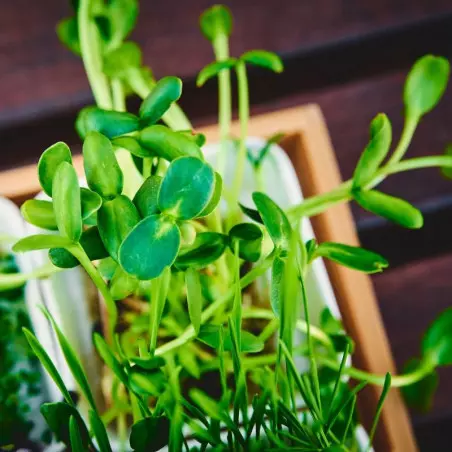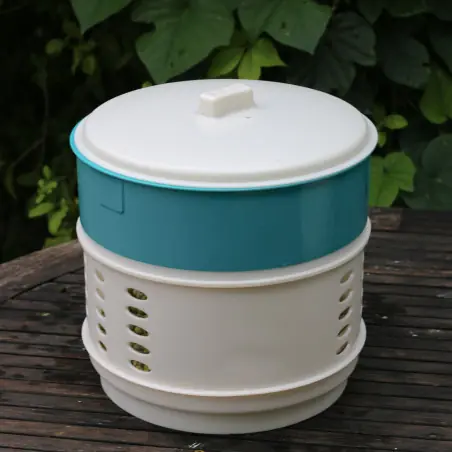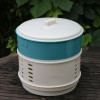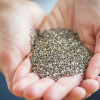Unhulled sunflower sprouts are a true nutritional treasure, still unknown to many. In this article, we will explore the numerous benefits of these little green wonders, their place in a living diet and how to easily incorporate them into your daily life. Whether you are a long-time enthusiast of living foods or simply curious to learn more about healthy eating, this article is for you!
Here is what you will discover:
- The unique nutritional benefits of sunflower sprouts,
- How sunflower sprouts can improve your health,
- Practical tips for growing and consuming these sprouts,
- Creative ideas for incorporating them into your daily diet.
What is unhulled sunflower?
Unhulled sunflower is distinguished by its intact shell that protects the seed, thus preserving its nutrients until the moment of germination. Unlike hulled sunflower seeds, unhulled seeds are ideal for germination, as their outer integrity allows for optimal freshness and promotes effective germination. It is precisely this protective shell that plays a crucial role in preserving nutritional resources, making sunflower sprouts a preferred option for those looking to enrich their diet with essential nutrients.
Integrating unhulled sunflower seeds into your diet offers you a concentrated source of vitamins, minerals, and beneficial phytocompounds. In addition to providing an excellent base for sunflower sprouts, these seeds also contribute to a living diet by offering nutritional support to your overall health. Their regular consumption can help boost your energy while strengthening immune and digestive functions, thus offering a delicious and nutritious alternative to other nutrient sources.
The germination process
Germination is a fascinating process that transforms a simple seed into a living and nutritious sprout. For unhulled sunflower seeds, this process begins by soaking them in water for several hours, which triggers the activation of enzymes and dormant nutrients. After soaking, the seeds are rinsed and placed in a humid but well-ventilated environment, thus promoting the growth of the sprouts.
During germination, profound nutritional changes occur: the sprouts become a true source of vitamins, with their vitamin C and B group content increasing significantly. This process makes them particularly interesting for supporting energy, digestion, and immunity. Proteins become more digestible due to the breakdown of complex proteins into simpler amino acids. Additionally, germination reduces the content of antinutrients, such as phytates, which can inhibit the absorption of certain minerals.
This process not only increases the nutritional value of these small seeds but also improves the bioavailability of essential nutrients, making them easier for our bodies to absorb. Thus, germination allows for obtaining a living food rich in energy, perfect for those who want to enrich their diet with easily assimilable nutrients. By incorporating sprouted sunflower seeds into your diet, you benefit from a concentrated intake of nutrients while supporting a lively and dynamic lifestyle.
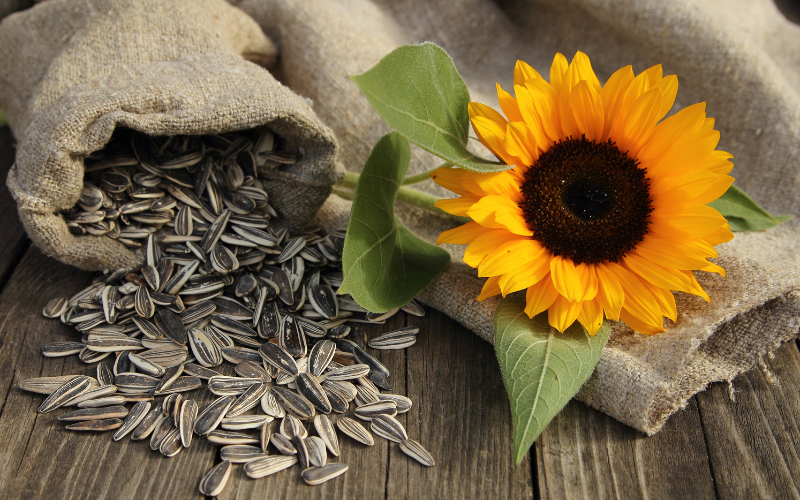
The Health Benefits of Sunflower Sprouts
Sunflower sprouts, derived from unshelled sunflower seeds, are true concentrates of essential nutrients, offering a multitude of benefits for your health.
A Concentrate of Nutrients
Unshelled sunflower sprouts are true superfoods, a good source of essential nutrients to strengthen the body's balance. They are packed with crucial vitamins like vitamin E, which plays a key role as an antioxidant, protecting cells against oxidative damage. Additionally, they contain significant amounts of B group vitamins, particularly vitamin B1, which helps convert nutrients into energy usable by the body, vitamin B3, which supports the digestive system and brain function and helps regulate cholesterol, and vitamin B9 (folic acid), which is essential for cell division and the formation of red blood cells.
In addition to this, there are several beneficial compounds, such as linoleic acid (omega-6) and oleic acid (omega-9), two essential fatty acids recognized for their role in preventing heart diseases, supporting cardiovascular health, and maintaining the integrity of cell membranes. The sprouts also provide pantothenic acid (vitamin B5), involved in energy production and hormone synthesis, as well as chlorogenic acid, a natural antioxidant known for its protective effects against oxidative stress and its role in regulating blood sugar levels.
Sunflower sprouts are an excellent source of minerals, notably magnesium, which plays a key role in nerve transmission and muscle contraction, and zinc, which supports the immune system and promotes wound healing. Compared to other common foods like spinach or broccoli, sunflower sprouts provide a higher concentration of these micronutrients, with the added benefit of being extremely low in calories.
By consuming these sprouts, you not only enrich your diet with dense nutrients but also promote better digestion thanks to their dietary fiber content. They offer improved bioavailability of vitamins and minerals, meaning your body can absorb and use them more efficiently than some cooked or processed foods.
To learn more about the benefits of sprouted seeds, check out our detailed articles:
What are the benefits of sprouted seeds?
Why are sprouted seeds mini adaptogenic plants?
Antioxidant Properties
Sunflower sprouts are a treasure trove of health benefits, rich in essential antioxidant compounds. These substances play a crucial role in protecting our body against damage caused by free radicals.
Role of Antioxidants
- Cellular Protection: Antioxidants, such as vitamin E and flavonoids present in sunflower sprouts, neutralize free radicals. This helps prevent premature aging and reduces the risk of chronic diseases.
- Immune Support: Regular consumption of sunflower sprouts strengthens the immune system and improves cardiovascular health by reducing oxidative stress on heart cells.
Scientific Studies
A study published in the "Journal of Agricultural and Food Chemistry" revealed that young sunflower sprouts contain higher concentrations of certain antioxidants compared to mature plants. This enhances their effectiveness in combating oxidative stress, a key factor in preventing many diseases.
Integration into Diet
Incorporating sunflower sprouts into your daily diet is simple and beneficial:
- Exceptional Nutrition: They offer a rich nutritional profile that contributes to a healthy lifestyle.
- Flavor and Health: In addition to enhancing the taste of your dishes, they actively contribute to the protection and improvement of your long-term health.
Adopting these little green wonders is an approach that combines taste pleasure and health benefits, while supporting a balanced and sustainable lifestyle.
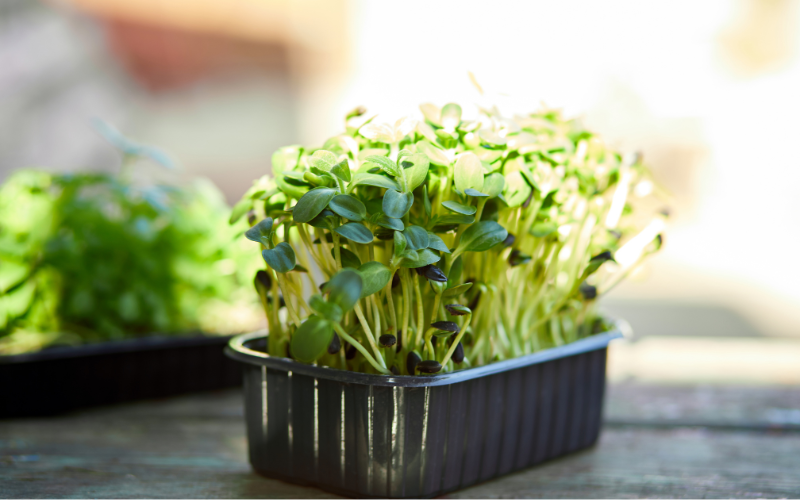
How to Grow Your Own Sunflower Sprouts
You can sprout your own unshelled sunflower seeds at home, and it's a rewarding and economical way to enjoy all their nutritional benefits. With a few simple steps and the right equipment, you can easily incorporate these superfoods into your daily routine. Start by getting sprouting sunflower seeds, specifically chosen for their ability to transform into delicious sprouts.
Step-by-Step Guide for Home Cultivation:
Soaking the Seeds: Start by soaking your sunflower seeds in water for about 8 to 12 hours. This step is essential to awaken the dormant enzymes and prepare the seeds for germination.
Rinsing and Draining: After these few hours of soaking, rinse the seeds well under clear water and drain them. Make sure the seeds are not too wet by gently shaking them.
Germination: Place the seeds in a suitable sprouter, such as the Easygreen Sol autonomous sprouter. Keep them in a well-ventilated environment and away from direct sunlight. Rinse them twice a day to prevent mold.
Harvesting: In 7 to 10 days of germination, beautiful green sprouts should emerge, reaching about 5 to 10 cm in height. You can cut them at the base to harvest and rinse them one last time before consumption.
Necessary Equipment and Practical Tips:
- Use a quality sprouter to ensure adequate ventilation and avoid water stagnation. You can discover our selection of sprouters in our shop HERE.
- Ensure that temperature and humidity conditions are optimal to encourage healthy germination.
- Keep an eye on the sprouts to detect any signs of mold and adjust your rinsing routine if necessary.
With these tips, you will have a successful harvest and enrich your diet with small, fresh, and vibrant sprouts.
Tips for a Successful Harvest
To ensure a bountiful and healthy harvest of your unshelled sunflower sprouts, it is crucial to master a few simple tips. Whether you are a novice or experienced in sprouting, these tips will help you optimize your cultivation and fully enjoy the nutritional benefits of sprouts.
Optimal Growth Conditions
The environment plays a key role in the success of your sprouting:
- Temperature: Maintain a stable room temperature between 20 and 25 °C to promote optimal growth.
- Light: Avoid direct sunlight exposure to prevent the drying out of the sprouts. Indirect light is sufficient to stimulate their development.
Resolving Common Issues
It is not uncommon to encounter some obstacles when growing sprouts. Here's how to resolve them:
- Less Germination: Check that the seeds have been sufficiently soaked and that the humidity level is appropriate.
- Mold: Rinse your seeds twice a day and ensure good ventilation to prevent mold from appearing.
- Yellowing of Sprouts: If your sprouts are yellowing, it may be due to a lack of light. Move them to a better-lit area, avoiding direct sunlight.
Shelf Life and Storage Methods
Once harvested, sunflower sprouts can be stored in the refrigerator for about a week. To maximize their shelf life:
- Use an airtight container or a slightly perforated plastic bag to maintain their freshness and crunchiness.
By following these tips, you will ensure that you always have delicious and nutritious sunflower sprouts on hand. They are ready to enrich your dishes with their beneficial properties, whether to enhance a salad, garnish a sandwich, or be consumed as they are. These sprouts are a valuable addition to a living and balanced diet.
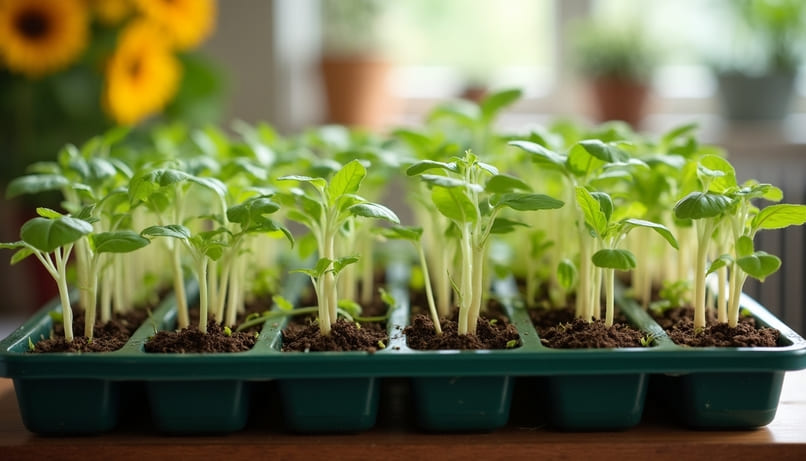
Incorporating Sunflower Sprouts into Your Diet
Unhulled sunflower sprouts lend themselves to a multitude of culinary uses that can easily be integrated into your daily food routine. Thanks to their mild and crunchy flavor, they can transform your dishes by adding a touch of freshness and vitality. Here are some healthy recipes and practical suggestions to include them in your meals while fully enjoying their benefits.
Creative and Tasty Recipes
Rich in nutrients, unhulled sunflower sprouts easily integrate into a balanced diet. By adding them to your daily meals, you enhance both the flavor and nutritional value of your dishes. Here are some simple and quick recipe ideas to make the most of them.
Fresh Salad with Sunflower Sprouts
Ingredients:
- A handful of sunflower sprouts
- A ripe avocado, diced
- A tomato, diced
- Fresh lemon juice
- Extra virgin olive oil
- Sea salt and black pepper to taste
Instructions:
- Mix the sunflower sprouts, avocado, and tomato in a large bowl.
- Add a drizzle of lemon juice and olive oil to season.
- Salt and pepper to taste.
- Serve immediately for a fresh and revitalizing dish.
Creamy Avocado and Sunflower Sprout Spread
Ingredients:
- A ripe avocado
- Two handfuls of sunflower sprouts
- A drizzle of lemon juice
- A clove of crushed garlic
- Salt and pepper to taste
Instructions:
- Mash the avocado in a bowl until smooth.
- Incorporate the finely chopped sunflower sprouts.
- Add the lemon juice, crushed garlic, salt, and pepper.
- Mix well and serve on crackers or cucumber slices.
Revitalizing Green Smoothie
Ingredients:
- A handful of raw sunflower sprouts
- A banana
- A cup of fresh spinach
- A cup of plant-based milk
- A teaspoon of chia seeds
Instructions:
- In a blender, combine all the ingredients until smooth.
- Adjust the consistency by adding more plant-based milk if necessary.
- Enjoy immediately for a natural energy boost.
Recommended Flavor Pairings
Sunflower sprouts pair perfectly with fresh and natural ingredients such as cucumber, lemon, and aromatic herbs like basil or cilantro. For an exotic touch, try them with tropical fruits like mango or pineapple.
Tips for Preserving Nutrients During Preparation
To maximize the nutritional intake of sunflower sprouts, it is essential to consume them raw and fresh. Add them just before serving your dishes to maintain their vitality. Keep your unshelled sprouts in a cool, dry place until germination to preserve their quality.
These recipes are just the beginning of many culinary possibilities with sunflower sprouts. They are ready to become a key ingredient in your healthy and vibrant diet.
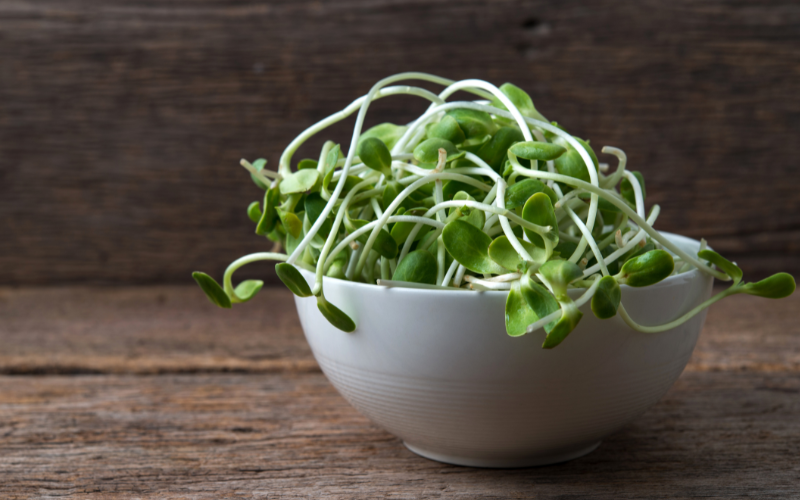
Conclusion
Unshelled sunflower sprouts prove to be a valuable addition to any conscious and vibrant diet, due to their exceptional nutritional values. They are a rich source of vitamins, minerals, and antioxidants, providing the body with essential nutrients in a fresh, vibrant, and highly assimilable form. They offer a great opportunity to boost your immune defenses, improve your digestion, and provide your body with a natural energy source. By regularly incorporating them into your meals, you not only support your well-being but also contribute to a more sustainable and balanced lifestyle.
Don't wait any longer to discover the benefits of sunflower sprouts for yourself. Try growing them at home for a fresh and tasty home harvest. Whether in a crunchy salad, a revitalizing smoothie, or a creamy spread, sunflower sprouts will enrich your daily life with their delicate taste and multiple virtues.
For more tips and inspiration on a living and organic diet, feel free to subscribe to our newsletter. You will receive exclusive content and practical tips to support your journey towards a healthier and more conscious life.
Your Questions and Our Answers (FAQ)
What is unhulled sunflower and why is it ideal for sprouting?
Unhulled sunflower is characterized by its intact shell that protects the seed, preserving its nutrients until sprouting. This outer shell ensures optimal freshness and effective germination, making it a preferred choice for producing sunflower sprouts rich in essential nutrients.
What are the nutritional benefits of sunflower sprouts for health?
Sunflower sprouts, derived from unhulled seeds, are rich in vitamins E and B, as well as minerals like magnesium and zinc. They offer antioxidant properties, strengthen the immune system, improve digestion thanks to natural enzymes, and contribute to better nutrient absorption for overall well-being.
How can sunflower sprouts be integrated into a daily diet?
Sunflower sprouts can be added to salads for extra crunch, used as a topping in sandwiches, or incorporated into smoothies for a nutrient boost. They pair well with fresh ingredients such as avocado, lemon, and aromatic herbs, enhancing both the flavors and nutritional value of dishes.
What is the process for sprouting unhulled sunflower seeds?
Sprouting begins by soaking unhulled sunflower seeds for 8 to 12 hours. Then, they should be rinsed and placed in a well-ventilated sprouter, away from direct sunlight. With rinsing twice a day, sprouts of 5 to 10 cm can be harvested in 7 to 10 days.
What are the common challenges when growing sunflower sprouts and how to overcome them?
Common issues include mold and yellowing of the sprouts. To avoid these problems, ensure good rinsing, adequate ventilation, and avoid direct sunlight. If the sprouts yellow, increase light exposure without placing them in direct sunlight.
Why are sunflower sprouts considered a superfood?
Sunflower sprouts are considered a superfood due to their high concentration of essential nutrients and low calorie content. They provide improved bioavailability of vitamins and minerals and are recognized for their antioxidant benefits, contributing to optimal health.
What scientific studies support the benefits of sunflower sprouts?
A study published in the "Journal of Agricultural and Food Chemistry" shows that young sunflower sprouts have higher concentrations of antioxidants than mature plants, making them particularly effective in combating oxidative stress and preventing certain diseases.
How to store sunflower sprouts after harvest?
After harvest, store sunflower sprouts in an airtight container in the refrigerator to maximize their shelf life, generally up to a week. Ensure they remain fresh and crunchy by avoiding excess moisture.



